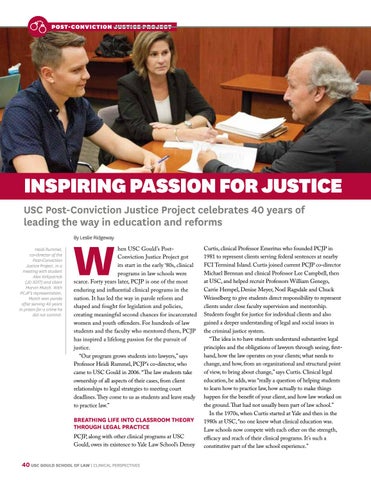POST-CONVICTION JUSTICE PROJECT
INSPIRING PASSION FOR JUSTICE USC Post-Conviction Justice Project celebrates 40 years of leading the way in education and reforms
W By Leslie Ridgeway
Heidi Rummel, co-director of the Post-Conviction Justice Project, in a meeting with student Alex Kirkpatrick (JD 2017) and client Marvin Mutch. With PCJP’s representation, Mutch won parole after serving 40 years in prison for a crime he did not commit.
hen USC Gould’s PostConviction Justice Project got its start in the early ‘80s, clinical programs in law schools were scarce. Forty years later, PCJP is one of the most enduring and influential clinical programs in the nation. It has led the way in parole reform and shaped and fought for legislation and policies, creating meaningful second chances for incarcerated women and youth offenders. For hundreds of law students and the faculty who mentored them, PCJP has inspired a lifelong passion for the pursuit of justice. “Our program grows students into lawyers,” says Professor Heidi Rummel, PCJP’s co-director, who came to USC Gould in 2006. “The law students take ownership of all aspects of their cases, from client relationships to legal strategies to meeting court deadlines. They come to us as students and leave ready to practice law.”
BREATHING LIFE INTO CLASSROOM THEORY THROUGH LEGAL PRACTICE PCJP, along with other clinical programs at USC Gould, owes its existence to Yale Law School’s Denny
40 USC GOULD SCHOOL OF LAW | CLINICAL PERSPECTIVES
Curtis, clinical Professor Emeritus who founded PCJP in 1981 to represent clients serving federal sentences at nearby FCI Terminal Island. Curtis joined current PCJP co-director Michael Brennan and clinical Professor Lee Campbell, then at USC, and helped recruit Professors William Genego, Carrie Hempel, Denise Meyer, Noel Ragsdale and Chuck Weisselberg to give students direct responsibility to represent clients under close faculty supervision and mentorship. Students fought for justice for individual clients and also gained a deeper understanding of legal and social issues in the criminal justice system. “The idea is to have students understand substantive legal principles and the obligations of lawyers through seeing, firsthand, how the law operates on your clients; what needs to change, and how, from an organizational and structural point of view, to bring about change,” says Curtis. Clinical legal education, he adds, was “really a question of helping students to learn how to practice law, how actually to make things happen for the benefit of your client, and how law worked on the ground. That had not usually been part of law school.” In the 1970s, when Curtis started at Yale and then in the 1980s at USC, “no one knew what clinical education was. Law schools now compete with each other on the strength, efficacy and reach of their clinical programs. It’s such a constitutive part of the law school experience.”













